#thread;; straits of steeds
Explore tagged Tumblr posts
Text
𝐒𝐭𝐫𝐚𝐢𝐭𝐬 𝐨𝐟 𝐒𝐭𝐞𝐞𝐝𝐬.
@blugilo
For as long as he was a voyage away, the prince could not be held immediately responsible for the kingdom of his birthright in anything but image. Altea and its people were far off, even despairingly so, but at the very least he has resolved to fulfill the role of his steed’s caretaker with no efforts spared.
Every remotely suitable afternoon Marth has cut away a small portion of the daylight hours to set Phobos out to graze in the communal pasture. Upon every same such occasion, he has also seen the stallion attempt to fraternize far too comfortably with the same pegasus. Always the same one.
It mortified him well beyond words! But with all the animals meandering across the grassland unfettered from their identifying saddles and bridles, a solid week passed before he could produce any notion of a name from the rider it belonged to. The truth eventually revealed unto him was a shock- and a curiously welcome one at that. Passing like two ships on a moonless night.. Marth could have spared a few more chuckles for the irony.
“Goodness, Palla. Had I known that you were the owner of the pegasus my Phobos was so taken by, I’d have spent a few less sleepless nights wondering what sort of apology could ever suffice!” The words drift with humor between the offhand bites of fruit, a foraged apple cupped in his hand as they cast their gazes down from atop the hillock. Watching their mounts with the fond air of two parents eyeing their frolicking children, though Marth himself was vigilant primarily for fear of another amorous mishap.
#◜ ��╰ ♕ ◦ › kingdom come ‹ WRITING. ◞#* THREAD. ‘ straits of steeds. ‘#* SUPPORT 01. palla.#bluglio#i find the idea of marth's horse & the whitewings' mounts Knowing each other#to be really cute..#caeda's pegasus is thrown into the mix as well (plead)#but i am Sorry his phobos is such a FLIRT ..#modern verse and he'd be that dog that humps ur guest's leg
10 notes
·
View notes
Text
Mors aurem vellens, 'Vivite,' ait, 'venio'
You are a young woman, fated to an early grave, divinely sent to become the Priestess of the least popular God of the Pantheon. Vergil, the God of Death.

Chapter One:
Your worn sandals hit the wooden gangplank as you disembarked along with the rest of the passengers, pausing for a brief moment to look at the splendor of the Island of Fortuna. Unfortunately you weren’t the only one eager to make landfall, and your moment of awe was cut short, as the other passengers, mostly pilgrims, pushed behind you, each wishing to experience that same feeling of wonder.
Fortuna… a glistening jewel of an island, a bustling hub of commerce, both of material goods, and immaterial ones. Where most large cities could boast maybe one, or two Temples at most, (the closest city near your village worshiped the Nameless Lady, Goddess of Revenge), Fortuna had the prestige of four separate temples, hence the large numbers of people coming to the city every day on pilgrimage.
The entranceway that the docks funneled pilgrims to was awe-insipring, beautiful white marble walls, with statues of each of the four gods.
Kyrie.... Goddess of Love, and of Song. Many would pray to her to find their soulmate, or to sway the heart of their desired one.
Her consort, Nero … God of Protection, and of the Outcasts. One might pray to him when going on a dangerous journey, and orphans and beggars would pray for his protection.
Sparda …. God of Justice. Those who sought justice in the courts, both civil and criminal, often prayed to him.
And finally, the one you had travelled months for, spent nearly all of your money on, was his wife, Eva … Goddess of Childbirth….and Healing. You marveled at her beautiful lifelike statue that stood there, overlooking the bay, carrying the infant twins Dante, (God of Victory in Battle, and also of Debauchery, his temple lay far to the west), and Vergil (God of Death, his temple was...unknown, as he was not a very popular god to worship.)
Your journey was coming to an end. You would soon be able to make your plea to the Goddess, to plead with her priests and priestesses to aid you. You were running out of time.
Three months ago, you had gone to an oracle of the Goddess of Time and Space, to see what your future would hold, and to find out why you had a persistent cough. The words he spoke chilled you to the bone.
“In two years time, Death will claim you.”
Keep reading, or click HERE to read on Ao3!
Suddenly, everything made sense. Your periods of lightheadedness, your cough, and how simple tasks would now occasionally leave you out of breath. Already, your family was beginning to act as if you were dead, your father and mother occasionally breaking out in tears when they saw you. In an instant, your entire life’s priorities had changed. Instead of looking forward to marrying a young man in the next village, inheriting your parents; farm, and raising a family, all now you could look forward to was to live each day to the fullest, before your inevitable demise.
But…
There might be another way. Perhaps one Goddess’s decree could cancel out another one. And so, you made plans. Your fiance’s family were willing to break up the betrothal. (You were slightly relieved, he was a nice man, but he just wasn’t the man you’d want to spend the rest of your life with) and your own family gave you the money that was to be your dowry. You signed away your share of the inheritance to your family’s farm to your younger brother, for an exchange of gold. And after a celebratory harvest feast, your family sent you on your way, with their blessings, hopes, and prayers. You would either come back hale and healthy, or not at all.
You couldn’t help yourself, at every opportunity, when the bustle of the crowds was not pushing you forward, you stopped and stared at the city before you. Your family was one of the most prosperous in your village, but they might as well have been begging for scraps with the dogs in comparison. Women strode by, wrapped in flowing robes, made of exotic materials, embroidered with gold thread. Men did business, each followed by half a dozen servants, each assigned to a mundane task, such as holding an umbrella to block out the sun, or to carry a parcel of business records. And everywhere, the wealth of Fortuna, no doubt flowing from its temples and the constant throngs of pilgrims, was on display, whitewashed buildings with mosaics made up of semi-precious stones. The sound of clinking coins as both locals and visitors exchanged money for the mundane, and the mystical.
You checked your pouch for what seemed like the hundredth time. Your trip had been taxing, both on your body, and your coin purse. You had just enough for an offering to access Lady Eva’s shrine, and to make your plea for healing. After that? Well, if it was successful, you’d find a way back home, you had skills that would fill your stomach and purchase passage back home, or to wherever your heart took you. (after all your traveling, you’d appreciated the vastness of the world over your tiny little village). Or… you’d spend your final days, penniless and alone.
Slowly, you realized that you’d not be alone in your situation. For even fortunate Fortuna, a city gilded in gold and marble, had a foundation made of rotten wood and crumbling sand. In alley ways scuffled the dregs of society, the forlorn and forgotten residents who could not take part in the bounty that the upper crust enjoyed.
And on even closer inspection, your amazement turned to disgust. For in a city that had a God of Justice, injustice reigned supreme, where unscrupulous vendors sold cheap trinkets for exorbitant prices, while the authorities looked the other way. A city that had a God of Protection, the strong dominated the weak, men in silk robes kicked dust in emaciated beggars faces. And a City that had a Goddess of Love, its residents cared for little besides themselves, and how to attain more wealth, how to exploit the visitors and the underclasses for their own benefit.
You munched on some stale bread, watching with growing horror as the facade disintegrated before your very eyes. The sooner you got out of here, the better. To be stuck on this island would be a death sentence, even if you were healed. But even in such dire straits, you admired the poor people’s resilience, their ability to endure. Not far from you, several scruffy children played knucklebones on the cobblestone, enjoying their life to the fullest, oblivious to their poverty. At least there was some innocence in such a cruel world.
From a distance you heard the sound of neighing horses and metal on stone. The throngs of people, both locals and visitors quickly got out of the way of a chariot going much too fast for such a narrow road. Its driver, a young man, bedecked in gold medallions laughed heartily along with a pretty young wench, dressed in equal finery. They sped along, their black stallion steeds frothing at the bit, uncaring of the danger they put the surrounding pedestrians in. Thankfully, they made such a racket, that nearly everyone was able to get out of their way in time, shouting curses at them as they went past, which were ignored. Even the raggamuffin children, intensely focussed on their game, realized the danger, and quickly scattered to the wind.
Well, all except one. A little girl, no older than ten, her frazzled red hair tied back in a rough ponytail, had either not heard the approach, or didn’t have the speed of her playmates to get out of the way.
Hopelessly, you attempted to run towards her, to get her out of the way, but even you knew there was no way you could have reached her before the chariot, which didn’t slow down at all, collided with her tiny body. And so, with a horrific sound, the girl was trampled underfoot, by four pairs of hooves, and one set of wheels.
You had expected the chariot to stop, or at the very least slow down, but the driver was either unaware, or more likely, didn’t seem to care, as it sped around a corner, one wheel lifting up as it did so. The last thing you heard was the crystal clear laughter of the youth, without a care in the world receding into the distance.
In the following silence, no one made a move towards the girl, in fact, after a few moments of shocked horror, everyone went back to their daily activities, as if nothing had even happened. The sprawled out body of the girl was to them, a piece of trash. At least with her fellow playmates, their disappearance was understandable. But there should be at least one kind soul that had the decency to care about the well being of this small child.
You would be that person, as you used your well worn staff to propel yourself towards the girl. Blood dribbled out of her ear and nose, and she remained still as death, but your fluttering fingers found a faint pulse, and to your great relief, a breath. Still, she was in a bad state, and would need help, if she would have any chance of survival. Quickly, you scanned the meandering group of people, who were watching you, while attempting to look like they WEREN'T watching you.
“Please!” You shouted, and for a moment, everyone froze. “Is there a healer here? Or does anyone know her parents?” After a brief hesitation, everyone went back to whatever more important tasks they had originally set out to do.
“ANYONE!?” You cried out, the smell of the girls blood choking your lungs, “Will anyone help?” No one did. The only response was the small whimpers and moans of pain from the unconcious girl.
Well, if no one was stepping up, you would have to be the one to save her. A farmer’s daughter, you knew all types of cures and treatments, but something like this? This was beyond your skill, most likely beyond the skill of even a physician. And as you looked up, to see the shining marble statue of Eva, her smile radiating down upon you, even from this distance, you realized that there was still a chance to save this flickering flame. Placing your staff on your back, you picked up the limp girl, and made your way to your ultimate destination. Strange, the girl seemed to weigh nothing.
You reached the gilded doors of the temple of Eva, guarded by two men, their bronze armour buffed to a shiny gleam. They were intimidating, but you had to try, for this little nameless girl's sake.
As you attempted to cross the threshold, in unison, their spears crossed, barring your way. You could always have attempted to push past them, but, odds were that the oracle’s prophecy for you would come true much, MUCH quicker.
“Please,” you pleaded, “This child needs healing, she needs Mother Eva’s blessing.”
“None enter this temple without an offering.” Their tone was as unyielding as the door behind them. “God's mercy! This isn’t some scam, a life hangs in the balance!”
The men scowled, and you couldn’t help but pull the child closer, to protect her.
“Fortuna’s laws are clear, the sacred places cannot be sullied by the empty handed.”
There would be no use arguing with them, even in such a dire situation. And so, you came to a fateful decision.
“I… have coin… the pouch on my hip.”
Within a blink of an eye, the one guard snatched it, and began to pour out your literal life savings into his palm, while his comrade kept his spear pointed at you. The greasy clink of coins being counted was the only sound you could hear. The man muttered something intelligible before pocketing the money, the gold being swallowed by billowing reams of cloth.
Without warning, the child was yanked out of your arms, and the guard carried her (far too roughly, in your opinion) into the sanctum. You went to follow, but the remaining guard blocked your path.
“Only those with an offering may enter,” he repeated mercilessly.
You were flabbergasted “B-but that’s all I have! I’m not going to do anything, I just want to make sure she’s alright!”
“Lady Eva looks after those who have made a sufficient gift, now begone!” And using the shaft of his spear, he shoved you to the ground, straight into a dirty puddle.
Part of you wanted to get up and punch him, part of you wanted to try to rush past him in an attempt to see the girl. The cruelty of it all was immeasurable, if the girl made it, she’d wake up alone and scared, and most likely possibly thrown out the moment she recovered.
But what could you do? Here, you had no friends, no connections, and now, most importantly in this wealth obsessed city, no money. And so, with a heavy heart, you attempted to wipe off some of the mud on your cloak, used your staff to pull yourself up, and left to go back to the pilgrim’s hostel, of which you had previously bought a night’s stay. Unless one of the Gods pitied you enough, it would be your last nights in relative comfort. All your travels, everything you had done for the past month...was all for naught. There was no way you could raise enough money for an offering...well, in time anyway. You were doomed.
You sat on the side of your cot, chewing on the last of the bread in your pocket. You wanted to give into despair, to just give up entirely. Tears in your eyes, you fell into slumber, with your only consolation was that the nameless red headed little girl would have a chance at the life you could never have.
The garden was beautiful, more than anything you’d ever seen in your travels. Vines climbed over ancient pillars, their leaves glossy and healthy, while vibrant blue roses bloomed, their sweet scent wafted over a barely there breeze. Statues of couples in romantic postures dotted the landscape, with the centerpiece being a winged man encircling both his arms and wings around his beloved, a woman carrying a harp. The fountain they stood atop of flowed out crystal clear water, which you could have sworn gave out an aroma of its own. What had you done to be invited to such a gorgeous locale? You wracked your mind, trying to think of how you got here, but all your memories of the past seemed to be clouded by fog. And strangely, you didn't seem to be worried about your inability to recall anything.
“Welcome!” A woman’s voice drew you out of your thoughts, and before you, a young woman smiled gently. You could have sworn there had been no one there a moment ago. “I have been waiting for your arrival for quite a while, please, this way.” Her arm, with simple gold bracelets that secured her sleeves, waved over to a set of klinai.
A mahogany table, with bowls of grapes, pomegranates and an assortment of other fruits, as well as a jar of wine, sat between the couches as both you and your host took your seats, and you enjoyed the texture of the cushioning crimson velvet.
“I’m sorry,” you apologised, “I didn’t mean to make you wait.”
Her laugh was musical, and entrancing. “No, it’s not you that is at fault. Fate often decrees that we must be patient.” She brushed away her vibrant red hair as she poured you a glass of wine, which you sipped. Whatever vintage it was, this was so good, it seemed out of place for a mere visit.
“Let me clarify,” she said as she plucked a grape from the bunch, “I haven’t been waiting for you specifically, but for someone of your selflessness and charity.”
Your eyebrows furrowed. You had no idea what she was speaking of, you were no more,no less righteous than the average person.
“Long have I despaired, for the rich people of my city have grown cold and hard, looking always to themselves than to their fellow men and women, while the poor cannot afford to do anything but focus on their very own survival. It took an outsider, someone not even coming to my temple, to show the charity that I so desperately sought.”
Before you could ask her to explain, a sparkling light enveloped her, almost blinding you, and as it dissipated, the woman had disappeared, replaced by a vaguely familiar child, her red hair in a less frazzled ponytail, dressed in brilliant white robes with a dusting of gold, instead of...rags?
She giggled, waved at you as you began to connect the dots, and with another equally blinding burst of light, transformed back to her adult self.
The cup of wine you held clattered to the ground, spilling its blood red contents upon the ground, as the realization hit, and you quickly averted your eyes, not daring to make eye contact with her. “L-lady Kyrie,” you stammered, terrified. For a mortal to look upon the Divine was a death sentence, “I-i didn’t realize...forgive your humble servant.” You attempted to get off the couch, in order to supplicate yourself, to spare yourself from her wrath, but were stopped by the gentlest touch upon your chin, slowly bringing your face upwards to her beautiful visage.
“What kind of host would I be if I struck down a guest I had invited? She chuckled again, sending tingles up and down your spine, before answering her own question, “a very poor one.” She relaxed back into her couch, “Without hesitation, you aided a stranger, and gave everything you had to save her. Such an action deserves to be granted a boon.”
Instantly, your mind went to the Oracle that had predicted your death. “Can you cure me?” Kyrie may not be the goddess of healing, but she was a Goddess, such a thing should not be beyond her power.
Unfortunately, her expression fell, “Sadly, I cannot. Not even Lady Eva could save you. Even us deities are bound by the decrees of the Lady of Time and Space.” Your heart crumbled. Your journey to somehow heal yourself had been doomed from the moment the oracle had murmured those words, no...most likely since before you were born.
“But…” she said, “I have a way to give you purpose...to hopefully make your final years make an indelible mark,” her hazel eyes were soft and sympathetic. “To the North, where the graves are made of red granite, lies Vergil’s temple. Long has it been forgotten and abandoned, and as much as he would deny it, he needs a priestess, to serve him, to help him remember…”
Remember what? You wanted to ask, but the world seemed to be a bit fuzzier, like a fog was billowing in.
“Make your way to that temple, and be His Priestess” Kyrie spoke, softly, but with the firmness of a sacred order, her face already obscured by mist, “In time, both you, and He will understand…”
A rush of wind, blew over you, and you awoke in a sweat, gasping for air in your cot. Such an intense dream, it had felt so real, but that’s what it all was, merely a dream. The question was, now that you were awake, where were you? Ah, yes… you were in a hostel in Fortuna...dying from an incurable disease and completely...broke?
To your left, glittering under the light of an oil lamp, was a golden coin, leaning against… your old coin purse? How odd, last time you had seen it, it was in that grubby hand of that guard that had cruelly ripped it away from you. And even odder, it looked like it was much fuller than before, as you hesitatingly reached out for it, your eyes widened to the size of platters as gold coins spilled out. Even before you had set out on your journey for salvation, you hadn’t had this much. You looked around rapidly, to see if there was a sign that someone had placed it there, but the only change was a single blue rose, freshly plucked, that lay on the table beside it. You swung your legs over the side of the bed, and you contemplated what it meant in the early morning stillness, your fingers caressing the velvet petals.
Taking a deep breath, you placed the coin purse on your belt, and with the help of your sturdy staff, you got up. You had a long day ahead of you. It was time to leave this island, with all of its corruption...and head…
North.
55 notes
·
View notes
Text
The Three Caballeros at 34
A review by Adam D. Jaspering
Mickey Mouse is, and always has been, the face of the Walt Disney Corporation. Perhaps it’s because of legacy or favoritism, because Donald Duck has often proven himself more popular. To expand on a quote from Walt Disney, it all started with a mouse, but a duck pays the bills. Never was this more apparent than in the 1940s.
As morbid as it seems, World War II was a great boon to Donald Duck’s popularity. Mickey Mouse represented an unflappable, upbeat everyman. He became popular during the Great Depression when people needed their morale lifted. Donald Duck was an angry fighter who got knocked down, and stood right back up, fists swinging. That sensibility was celebrated by many during the war. Seeing the influence he had, Walt Disney capitalized on his creation.
Donald was commissioned by many sources during World War II. The US Treasury, the United Way, and the Canadian Film Board all commissioned cartoons from Disney Studios. His likeness was merchandised in countless other places. Within months, Donald Duck was promoting war bonds and celebrating American resilience coast to coast.

Later, Donald joined the US Army, encouraging enlistment. As an act of patriotism, Disney produced seven of these shorts at cost for the armed forces. Why he opted for Donald to join the Army as opposed to the Navy, as is often suggested by his sailor outfit, is a mystery. Donald wasn’t the official face of the war effort, but not for lack of trying.
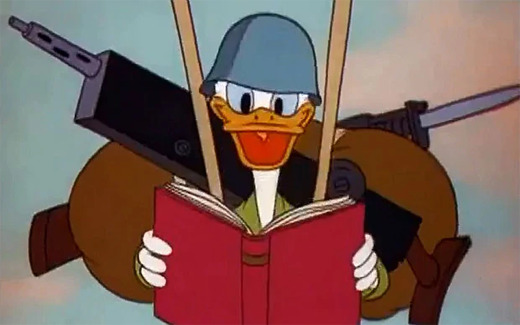
In 1944, three separate events lined up. First, World War II was still ongoing. Second, Disney Studios was celebrating Donald’s tenth anniversary. Third, the follow-up to Saludos Amigos was nearing completion. It was time for another cinematic saga of comradery in the western hemisphere, this time featuring Donald Duck front and center.
Saludos Amigos was a rush job. Disney Studios churned it out for immediate financial returns. The writers and animators had unused ideas leftover. Some ideas were more dynamic and required money and time, not available in 1941. Now with a foot-hold on the Latin American film market, the studio was able to make a proper follow-up. That was The Three Caballeros.
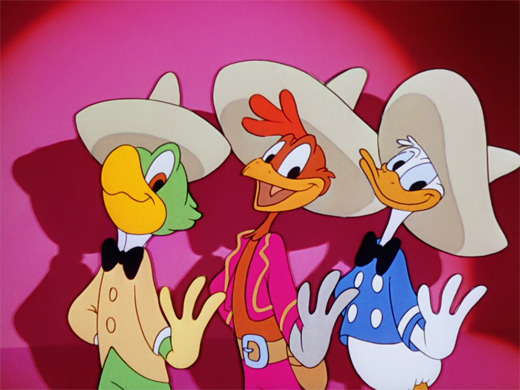
The Three Caballeros uses the 10th anniversary of Donald Duck’s creation as a framing device. Throughout the film, Donald opens a multitude of gifts from friends and well-wishers. Each gift prompts or frames a new vignette. Like Saludos Amigos, the vignettes of The Three Caballeros were created to foster international goodwill between Latin America and the United States.
The first gift is a projector and film canister. The movie is The Cold-Blooded Penguin. It features a penguin named Pablo who dislikes living in Antarctica. Pablo hates the cold, and wishes to live in a tropical climate. One day, he pools his resources, and sets out on an ice floe for warmer weather.

Astute readers will notice the error immediately. What on Earth is a cartoon about a penguin doing in a film about Latin America?
It’s true, Pablo’s journey takes him around some of the coastal geographic features of South America’s west coast. These aren’t so much landmarks as name drops. We hear the narrator mention the Straits of Magellan, Cape Horn, Juan Fernandez Islands, Vina Del Mar, Lima, and the Galapagos Islands. But what’s depicted onscreen are rather nondescript landforms. These could be any straits, any coasts, and any islands.
The Cold-Blooded Penguin’s ties to South America are incredibly tenuous. Plainly, it does not belong as part of the film. So much so, it’s not even worth commenting on the animation or story. You could make the greatest rotisserie chicken in culinary history, but if you serve it atop an ice cream sundae, no one will care how the chicken tastes.
The short shamelessly tries to mask itself as an extended cutaway from a larger feature called “Aves Raras,” or “Rare Birds.” The non-penguin half of this short does indeed focus on the indigenous fauna of South America. Somewhat farcically, but also with an informative nugget. This infotainment is what The Three Caballeros aspires to be, and achieves in certain quantities.
Unfortunately, the filmmakers either get lazy or distracted. Strewn among the cultural aspects are nonsense and unsupportive jokes. Either the filmmakers were padding the film or afraid of losing the attention of a younger audience. The end result bogs down quality with unnecessary jetsam.
The highlight of the Rare Birds segment is the Aracuan Bird. This bird has a high-pitched, sped-up voice, and a warbled laugh. He has a screwball sense of humor, and an innate ability to antagonize all those who he comes into contact with. He has a bright red crest, a yellow beak, and oversized eyes. He debuted four years after another cartoon bird with alarmingly similar characteristics: Woody Woodpecker.

Woody Woodpecker first appeared in the 1940 short Knock Knock. Walter Lantz created the character, and licensed him to Universal Studios. The similarities between The Aracuan Bird and Woody cannot be ignored. I can find no information explaining this coincidence. There were no complaints filed, and no legal action by Lantz or Universal. It’s rather unlikely Disney’s animators resorted to plagiarism; we can only assume it was an unintentional, subconscious reproduction.
The Aracuan Bird appears here, and in two more brief scenes. He then disappears for the remainder of the film. One would think he would be a running gag, appearing regularly throughout the movie. Or at the very least, he would be a main feature in his own vignette, his other appearances being callbacks. He would certainly be more on-theme than The Cold-Blooded Penguin.
The Aracuan Bird is an unpleasant reminder that The Three Caballeros was a pile of ideas leftover from Saludos Amigos. He is introduced, then subsequently forgotten. The movie was the production of different animators and writers, working independently. They each had their own ideas, and didn’t seek consultation. These ideas are threaded together as best as possible, but big gaps in style and substance exist.
The next vignette is The Flying Gauchito, set in the pampas of Uruguay. It is the story of a child, looking for the approval of the gauchos of his village. The boy goes on a hunting expedition, finding the rarest game of all: a winged donkey.
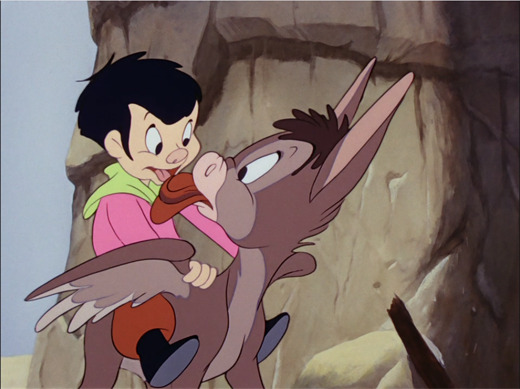
The donkey is named ‘Burrito,’ the Spanish word ‘Little Donkey’ (which existed long before the popular Tex-Mex dish). Gauchito returns home with his newly acquired winged steed. Rather than show him off, Burrito is entered in a horse race. It’s one thing to show-off your luck. It’s another thing to demonstrate your worth.
What makes The Flying Gauchito special isn’t its story. Will and determination overcoming the established norms is a common moral. The true strength of the short is its utilization of an unreliable narrator. Gauchito’s journey is narrated by his older self, narrating from an omniscient standpoint in the future. It would be easy for him to tell the story accurately. Instead, he’s forgetful, indecisive, and admittedly unsure of specific details.

This narrative style creates not only a humorous structure, but humorous accompanying animation. Whenever a detail is “corrected” or second-guessed, the corresponding imagery is swapped out. In quick succession, the characters onscreen are left helpless as their world is ad hoc corrected. They must endure a shifting landscape and environment before they can react accordingly. This gives them a sense of instability, like they’re wearing roller skates, or walking a tightrope. It’s an advanced narrative technique, and it’s executed well.
With two and a half shorts finished, Donald Duck moves onto his next present. Inside is his friend and Saludos Amigos costar Jose Carioca. Jose is just as jovial and passionate as ever, but now smoking a giant cigar shamelessly for all children to see. We’re a long way from the warnings of Pleasure Island.
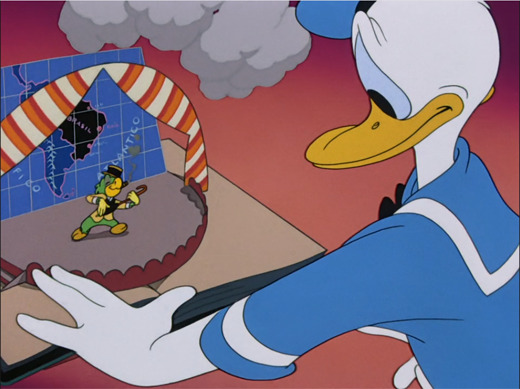
Jose introduces Donald to the Brazilian city of Baia. In a combined mood of nostalgia and admiration, Jose begins a long musical serenade. As his memories and thoughts are manifest to reality, we are swept away in the romantic imagery. The pinks and purples of the city at sunset are wonderfully done.
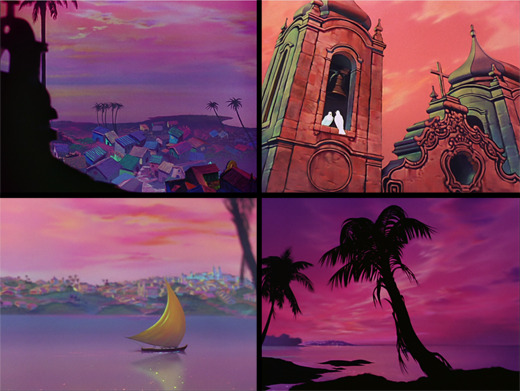
The two avian friends find themselves at a celebration on the streets of Baia. They’re joined by singer and dancer Aurora Miranda, plus a small army of samba dancers. The interplay of cartoon and human is outdated by today’s standards, but to an audience in 1944, it must have seemed groundbreaking. The technique is used extensively throughout the remainder of The Three Caballeros, and to great effect. It’s a gimmick, but a gimmick employed and accomplished well.

Exiting the glory of Baia, Donald opens his next gift from a stranger in Mexico. The unfamiliarity is temporary. Inside the gift is the loud, ecstatic, pistol-packing Panchito Pistoles. This firebrand is so eager to meet both Donald and Jose, he declares the trio “The Three Caballeros.” Finally, forty minutes into the picture, well past the halfway mark, we meet the last of our title characters.
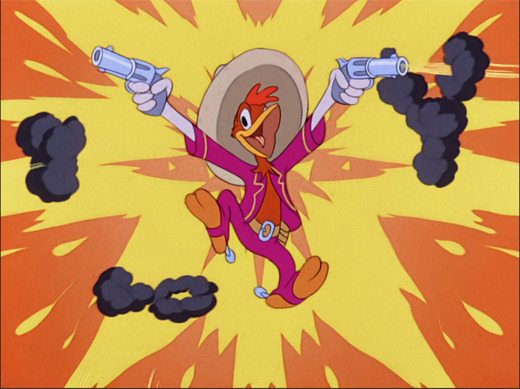
After a fiery song and dance number, Panchito introduces Donald to the piñata. Panchito identifies it as a Mexican Christmas tradition (The Three Caballeros was scheduled for a December release date). Until this point, Panchito has been a quite vocal and boisterous individual. Hearing him tell a reverent and humble tale of Christmas tradition displays his hidden depths. Panchito could have been a shallow and one-note character. Instead, we see him capable of many things.
Cracking open the piñata, Donald is treated to a tour of Mexico’s most popular sights. Panchito summons a serape, which flies like Aladdin’s magic carpet. The Three Caballeros visit the exotic locales of Pátzcuaro, Veracruz, and Acapulco.
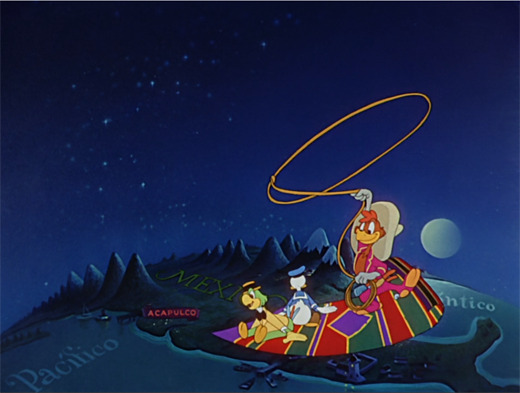
Until this point, both Donald and Jose were nothing more than enthusiastic partygoers. They enjoyed the celebrations and sights of their destinations. And they never shied away from the pleasant company of a gorgeous woman. For whatever reason, upon visiting Mexico, something stirs in the mind of Donald.
Going forwards, every woman Donald encounters is an object of lustful desire. Singing girls, dancing girls, sunbathing girls; Donald wants them all. Jose and Panchito do their best to subtly remind Donald he is a cartoon duck in a G-Rated movie, but Donald is driven by his id.
It’s a common cartoon trope for a character to be so blindsided by a woman’s physical attraction, they lose control. From the works of pre-Hays Code Betty Boop shorts, to the then-contemporary Tex Avery, it was a well-established joke. Donald, however, is completely insatiable and unstoppable. It starts funny, gets ridiculous, and then turns downright disturbing. Donald Duck is insatiably in love with these Latin beauties, and cannot be tamed. It’s a running gag that runs far too long. Panchito shouldn’t have shown Donald a hot beach, he should have shown him a cold shower.
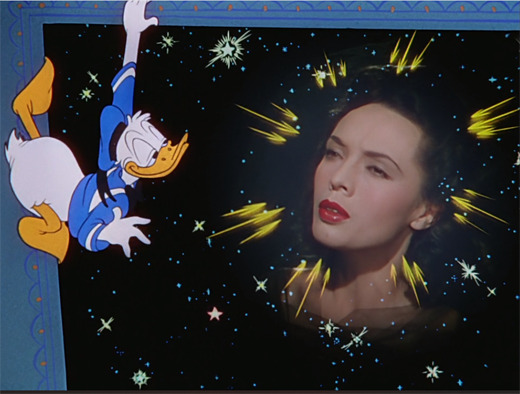
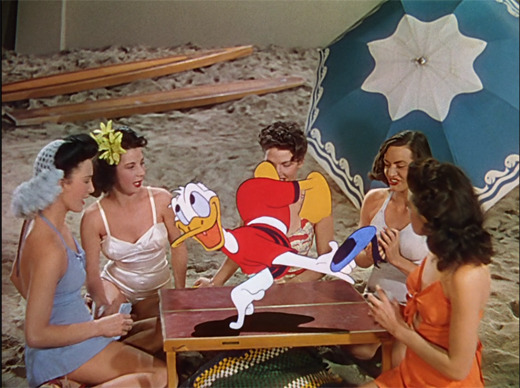
The movie ends in quite an interesting way. Instead of a traditional song and dance number celebrating Mexico, the remaining twenty minutes of film is a surreal, avant garde display. More than ‘Toccata and Fugue’ from Fantasia. More than ‘Pink Elephants on Parade’ from Dumbo. Things are odd, formless, wild, and baffling. And lots of fun.
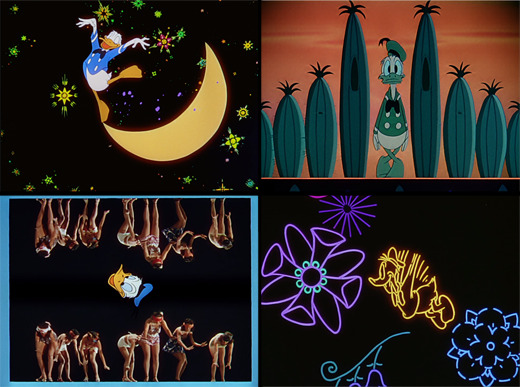
The Three Caballeros’s primary problem is how unbalanced it is. Any ten minute stretch is vastly different from any other. But it is unbalanced in a linear fashion. As the movie progresses, it becomes more cohesive and more audacious. Things are always building towards the (literally) explosive climax.
It begins with one short that doesn’t belong in the film at all. It moves onto a second short that, while more appropriate, could easily be excised. Jose is introduced, giving the movie more structure and narrative harmony. With him, more advanced animation techniques are employed. Panchito is introduced, giving the film a solid shape and definition. Finally, we’re treated to a grand tour de force. Disney’s animators use every trick to deliver a mindboggling trip for the eyes and ears.
The Three Caballeros as a group existed as Disney second-stringers for many years. Donald Duck remained as popular as ever, but it was rare to see Jose or Panchito acknowledged by the studio. Early in the 21st century, the cult popularity of the film prompted a resurgence for the forgone trio.
The Three Caballeros are featured at the Mexican Pavilion of Epcot Center (despite only one of the three members being Mexican). Don Rosa wrote two sequels for the trio, published in comic form. They’ve appeared in Disney television shows, such as House of Mouse, and 2017′s DuckTales. They even star in their own series on Disney+, where they become globetrotting fantasy heroes.
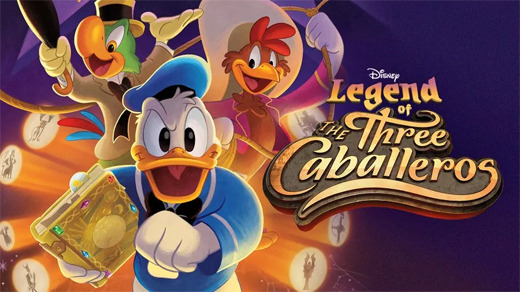
The Three Caballeros expands on the ideas of its predecessor, Saludos Amigos. A multitude of animation techniques continues the celebration of harmony in the Americas. Music, laughter, and a love of exploration unite us all. While the end result is something of a mixed bag, the highs are demonstrably high. It will stimulate some viewers while outright confounding others. But in the end, the wild, surreal adventure is a voyage worth taking. Hasta luego.
Fantasia Snow White and the Seven Dwarfs Pinocchio Bambi The Three Caballeros Dumbo Saludos Amigos
#The Three Caballeros#Walt Disney#Walt Disney Animation Studios#Disney#disney studios#Film Criticism#film analysis#review#movie review#Disney Canon
37 notes
·
View notes